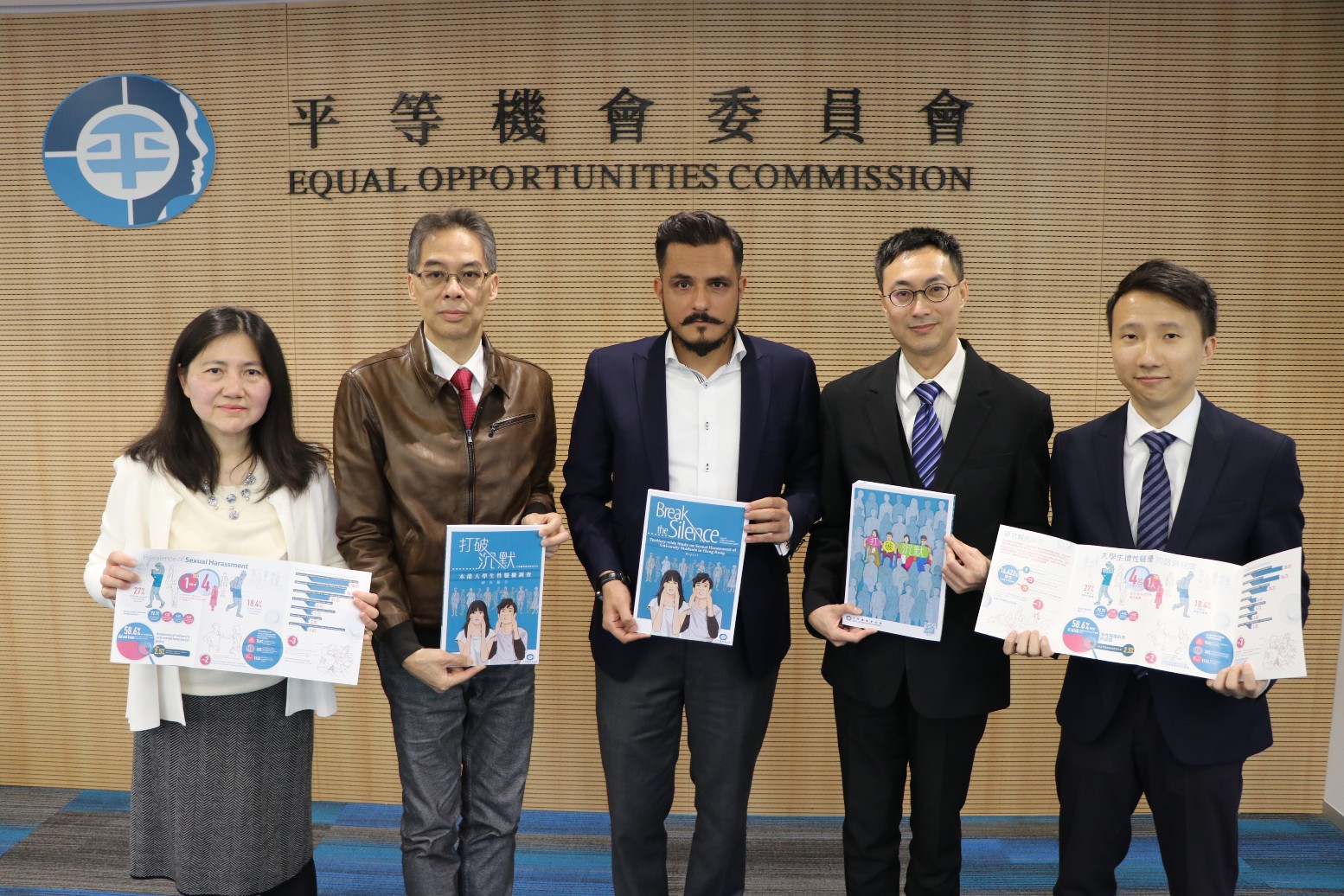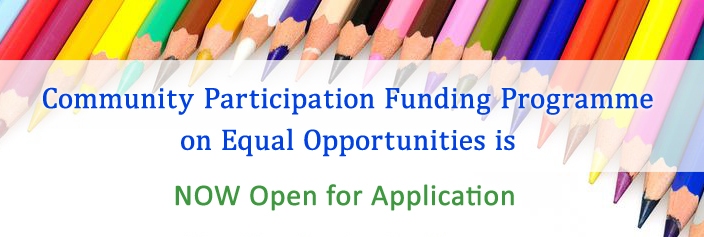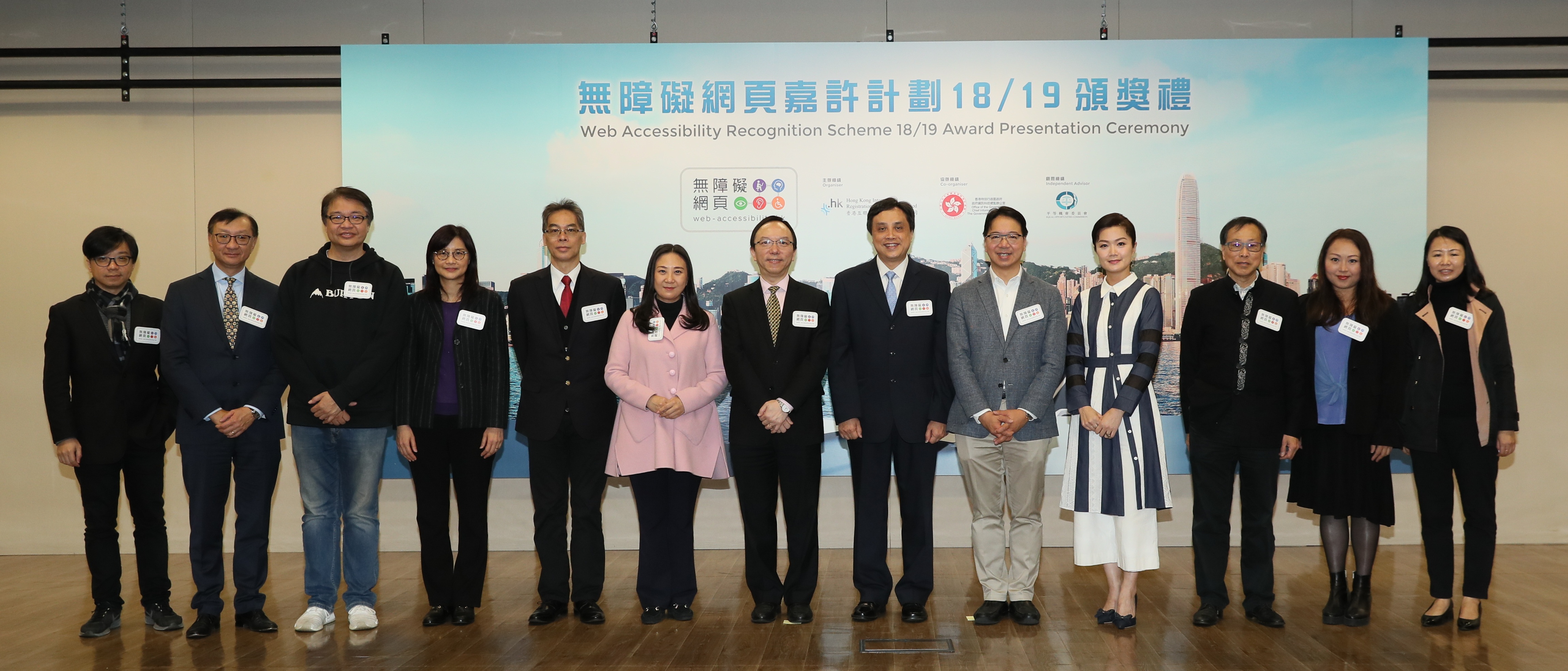|
  | |
Tel: 2511 8211 / Fax: 2511 8142 / SMS: 6972566616538 |
News from the EOC
Issue 202 | 23 January 2019 |
中文版

Despite ongoing preventive efforts among local universities, incidents of sexual harassment still make news every now and again, from professors making unwanted advances on students to freshmen being pressured into playing sexually charged games at orientation camps. For any solution to be effective, we need to first grasp the full picture of sexual harassment of university students in Hong Kong. The EOC thus conducted a territory-wide study in 2018, the findings of which were released on 21 January 2019.
The largest of its kind in Hong Kong, the study consisted of an online survey of 14,442 full-time undergraduate and postgraduate students from nine universities, in-depth interviews with 28 students who had reported experience of sexual harassment, and a focus group discussion with university representatives.
It was found that almost one-fourth (23%) of university students were sexually harassed on-campus, off-campus and/or online within the 12 months before they took the survey, and yet a mere 2.5% lodged a complaint with the university. In fact, more than half (58.6%) were unaware of the existing anti-sexual harassment policy at their universities. Their knowledge of what constitutes sexual harassment also proved lacking, with nearly one-fourth (25.0%) failing to identify four scenarios of sexual harassment or above, out of the eight examples listed.
“The prevalance of sexual harassment at local universities is real and highly alarming. There are multiple factors as revealed in the study, including a tendency to trivialise certain harassing acts, a misunderstanding of consent, gender stereotypes, a victim-blaming culture, the silence of bystanders, and the abuse of power by people in positions of authority,” said Prof Alfred CHAN Cheung-ming, Chairperson of the EOC. “We have put forward a total of 17 recommendations along four directions, namely: university’s commitment and governance; a victim-centric reporting mechanism in responding to sexual harassment; awareness training for attitude changing; and comprehensive sexuality education. We are approaching the nine participating universities to line up meetings with the Presidents and/or university representatives, so that we may discuss how these measures can be implemented. We do hope all educational institutions will share the EOC’s commitment to addressing the problem at its roots and creating a safe and nurturing environment for all students, free from fear and harassment.”
The study has captured immediate media attention since its release. Dr Ferrick CHU, acting Chief Operations Officer of the EOC, has given various interviews to further explain the significance of the findings. “Bystander apathy and the trend of underreporting among university students are deeply concerning,” said Dr Chu. “They are, after all, the builders of our future. What happens on a campus today may well repeat itself in a workplace years after. Nurturing a sense of gender justice among the younger generation, therefore, is just as much a priority as strengthening universities’ complaint-handling mechanisms.”
Read the executive summary
Read the report in full
Utilise EOC’s bank of anti-sexual harassment resources
Read news reports on the study
*********************************************

While barrier-free facilities have become a less obscure concept over the past few years, people with disabilities (PWDs) continue to encounter obstacles in different areas of life from time to time. Recently, the EOC received enquiries about the barriers PWDs face when participating in shareholder meetings held by listed companies, a seemingly commonplace activity in the eyes of able-bodied investors.
In an article published in
Hong Kong Economic Journal,
Hong Kong Free Press,
Inmedia,
Stand News and
The Standard this month, EOC Chairperson, Prof Alfred CHAN Cheung-ming highlighted the importance of addressing the issue. “Currently, it is not uncommon for companies to issue meeting notices that only contain information on the time, place and agenda of the meeting, with no mention of barrier-free routes to the venue, the barrier-free facilities available there, or the accommodating measures – if any – to be arranged during the meeting,” wrote Prof Chan. “If the venue does not come with barrier-free access, then wheelchair users will not be able to attend; likewise, people with hearing impairment will be excluded from discussions if there is no sign language interpretation service.”
According to section 26 of the Disability Discrimination Ordinance (DDO), it is unlawful to discriminate against PWDs by refusing to provide them with goods, services or facilities, paid or otherwise. Unless there is unjustifiable hardship in addressing their needs, failure to provide PWDs with reasonable accommodation – whether it is picking an inaccessible meeting venue or declining requests for assistive devices or arrangements – may constitute indirect discrimination and lead to civil liability.
In a letter issued to the Hong Kong Institute of Chartered Secretaries in October 2018, the EOC recommended that all meeting notices should include a reply slip for potential participants to indicate any special needs they might have. This practical solution would allow companies to plan ahead and make accommodating arrangements. Indeed, we hope to inspire a stronger commitment to accessibility among organisers of all kinds of meetings, from conferences and seminars to business pitches and public consultation sessions.
Read Prof Chan’s article
More on DDO
*********************************************

Even the best idea needs resources to come to fruition. If you are committed to driving changes in Hong Kong’s equality landscape but having a hard time greasing the wheels, do consider joining the EOC’s Community Participation Funding Programme. Open for applications until 15 March 2019, the programme offers a maximum of HK$50,000 to each approved project and testifies to our belief in collaborating with community organisations to spread the message of anti-discrimination.
Briefing sessions in Cantonese and English will be held at the EOC Office in Wong Chuk Hang on 19 February (11am – 12:15pm) and 21 February (4pm – 5:15pm) respectively. Grab the opportunity to meet us and know more about the programme!
Find out if you are eligible
Sign up for briefing sessions
Get directions to the EOC Office
*********************************************

Computers, tablets and smartphones have revolutionised the way we shop, study, find jobs, get our news, manage finances, and connect with our friends and loved ones. Yet, the digital world, however easy and colourful it has made our life, will remain off-limits to people with disabilities (PWDs) when websites and mobile applications fail to provide text alternatives for images, captions for videos, or PDF files in an accessible format.
A longtime advocate of digital inclusion, the EOC has continued to promote awareness in the ICT sector of the importance of accommodating PWDs’ needs and the benefits it brings to business by serving as an independent advisor to the Web Accessibility Recognition Scheme, among other initiatives. Organised by Hong Kong Internet Registration Corporation Limited (HKIRC) and co-organised by the Office of Government Chief Information Officer (OGCIO), the scheme seeks to incentivise local enterprises and organisations to design accessible websites and mobile applications. Subject to the number of accessibility criteria they meet, applicants have the chance to receive the Gold Award, the Silver Award or the Friendly Website / Mobile App award. In addition, the prestigious Triple Gold Award is presented to applicants honoured with the Gold Award for three consecutive scheme years.
The second award ceremony under the scheme’s 2018-19 edition was held on 16 January 2019, with dozens of companies and developers obtaining recognition. Dr Ferrick CHU, acting Chief Operations Officer of the EOC, was one of the officiating guests. To view photos from the ceremony, please visit HKIRC’s Facebook page by clicking the link below.
Visit HKIRC on Facebook
Learn more about the scheme
Expand your knowledge of web accessibility
*********************************************

The extension of Hong Kong’s statutory paternity leave to five days took effect on 18 January 2019.
Male employees with a child born on or after 18 January 2019 are now entitled to five day’s paternity leave for each confinement of their spouse/partner. It may be taken in one go or on separate days, within the period of four weeks prior to the expected date of delivery and 10 weeks following the actual birth of the child.
Prior notice must be given to employers. If the employee has already notified his employer of his intention to take paternity leave at least three months before the expected date of delivery, he may take the leave immediately after informing his employer of the actual dates of leave. In case the employee fails to give the three months’ advance notice, he must notify the employer of the dates of leave at least five days before taking it.
To be eligible for paternity leave pay, the employee is required to have worked under a continuous contract of at least 40 weeks immediately before the intended leave commences.
Read the Government’s press release
Find out more on the Labour Department website
*********************************************
Visit our website or download the EOC mobile app (Apple App Store / Google Play) to stay updated on the EOC’s work and positions, and to review our press releases and calendar training. Also, stay tuned on other equal opportunities issues and community initiatives by visiting our community resources and community events pages for information from our community partners, including publications, survey reports, publicity campaigns, and upcoming conferences.


 While barrier-free facilities have become a less obscure concept over the past few years, people with disabilities (PWDs) continue to encounter obstacles in different areas of life from time to time. Recently, the EOC received enquiries about the barriers PWDs face when participating in shareholder meetings held by listed companies, a seemingly commonplace activity in the eyes of able-bodied investors.
While barrier-free facilities have become a less obscure concept over the past few years, people with disabilities (PWDs) continue to encounter obstacles in different areas of life from time to time. Recently, the EOC received enquiries about the barriers PWDs face when participating in shareholder meetings held by listed companies, a seemingly commonplace activity in the eyes of able-bodied investors. Even the best idea needs resources to come to fruition. If you are committed to driving changes in Hong Kong’s equality landscape but having a hard time greasing the wheels, do consider joining the EOC’s Community Participation Funding Programme. Open for applications until 15 March 2019, the programme offers a maximum of HK$50,000 to each approved project and testifies to our belief in collaborating with community organisations to spread the message of anti-discrimination.
Even the best idea needs resources to come to fruition. If you are committed to driving changes in Hong Kong’s equality landscape but having a hard time greasing the wheels, do consider joining the EOC’s Community Participation Funding Programme. Open for applications until 15 March 2019, the programme offers a maximum of HK$50,000 to each approved project and testifies to our belief in collaborating with community organisations to spread the message of anti-discrimination. The extension of Hong Kong’s statutory paternity leave to five days took effect on 18 January 2019.
The extension of Hong Kong’s statutory paternity leave to five days took effect on 18 January 2019.